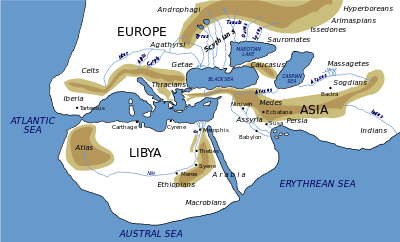Libya (mythology)

Libya (from Greek: Λιβύη) is the daughter of Epaphus, King of Egypt, in both Greek and Roman mythology. She personified the land of Ancient Libya in North Africa, from which the name of modern-day Libya originated.
Greek mythology
In Greek mythology, Libya, like Ethiopia or Scythia was one of the mythic outlands that encircled the familiar Greek world of the Hellenes and their "foreign" neighbors.
Personified as an individual, Libya was the daughter of Epaphus — King of Egypt and the son of Zeus and Io— and Memphis. Libya was ravished by the god Poseidon to whom she bore twin sons, Belus and Agenor. Some sources name a third son, named Lelex.
Roman mythology
In Roman mythology, Libya was the daughter of Epaphus, King of Egypt, and his wife Cassiopeia. She married Neptune, a foreigner of much power whose real name is unknown. Libya and Neptune had a son called Busiris, who became a brutal tyrant of Upper Egypt.[1]
The territory that she ruled, Ancient Libya, and the country of modern day Libya are named after her.[2]
Argive genealogy in Greek mythology
Notes
References
- Isidore, Etymologiae xiv.4.1, 5.1
- Augustine, De civitate dei xviii.12
- Lactantius Placidus, Commentarii in Sattii Thebaida iv.737